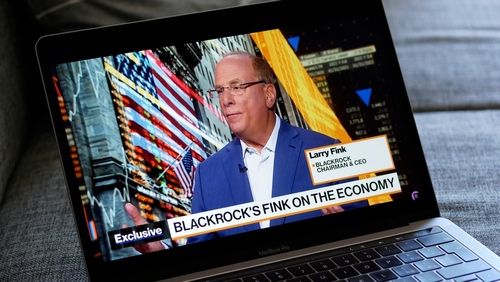Longevity and greater spending are “putting the U.S. retirement system under immense strain,” BlackRock CEO Larry Fink wrote in his annual letter to shareholders.
In the letter, bluntly titled “Time to Rethink Retirement,” Fink argued that capital markets will be critical in addressing what he called one of the century’s biggest challenges, “providing people with a secure, well-earned retirement.”
Innovations in medicine are leading to longer lifespans and a “frustrating irony: As a society, we focus a tremendous amount of energy on helping people live longer lives. But not even a fraction of that effort is spent helping people afford those extra years.”
Fink’s letter comes as concerns over Social Security's solvency continue, and debate grows among academics and policymakers over the effectiveness of defined contribution-style retirement plans.
“No one should have to work longer than they want to. But I do think it’s a bit crazy that our anchor idea for the right retirement age—65 years old—originates from the time of the Ottoman Empire,” Fink wrote, calling for an increase in the retirement age.
He praised state-sponsored plans—specifically Colorado and Virginia—and noted the auto-features in SECURE 2.0.
“As a nation, we should do everything we can to make retirement investing more automatic for workers,” Fink wrote. “And there are already bright spots. Next year, a new federal law will kick in, requiring employers that set up new 401(k) plans to auto-enroll their new workers. Plus, there are hundreds of major companies (including BlackRock) that have already taken this step voluntarily.”
He called for plan sponsors to do more, like providing a match and offering financial education on the difference between contributing a small percentage to a retirement plan versus the maximum amount. He also mentioned auto-portability and the need for workers to transfer 401(k) savings easily when switching jobs.
“There is a menu of options here, and we need to explore all of them,” he wrote.
Fink mentioned BlackRock research that found that after nearly two decades of retirement, the average person still had 80% of their pre-retirement money saved, yet was anxious about their finances. Just 32% reported feeling comfortable spending what they saved. He blamed it on the shift from defined benefit to defined contribution plans, calling it “a shift from financial certainty to financial uncertainty.”
As it was a shareholder letter, he naturally pitched a new product as a solution to what he described.
“Could we develop an investment strategy that provided the flexibility of a 401(k) investment but also the potential for a predictable, paycheck-like income stream, similar to a pension?” Fink asked. “It turns out we could. That strategy is called LifePath Paycheck, which will go live in April. As I write this, 14 retirement plan sponsors are planning to make LifePath Paycheck available to 500,000 employees. I believe it will one day be the most used investment strategy in defined contribution plans.”
He concluded by pointing to what he called the biggest barrier to investing for the future—fear.
“In my view, it’s not just affordability or complexity or the fact that people are too busy to enroll in their employer’s plan … Young people have lost trust in older generations. The burden is on us to get it back. And maybe investing for their long-term goals, including retirement, isn’t such a bad place to begin.”

